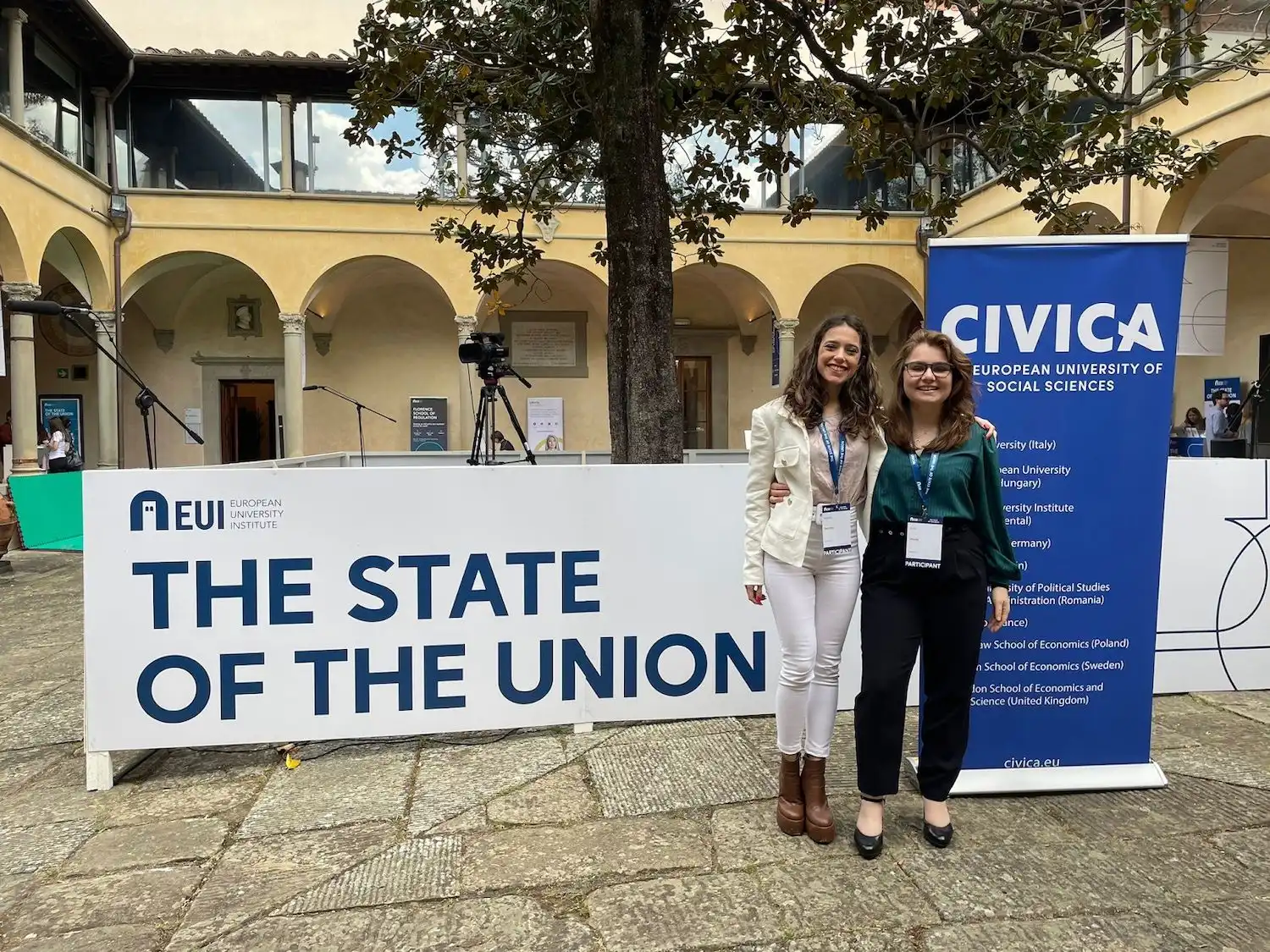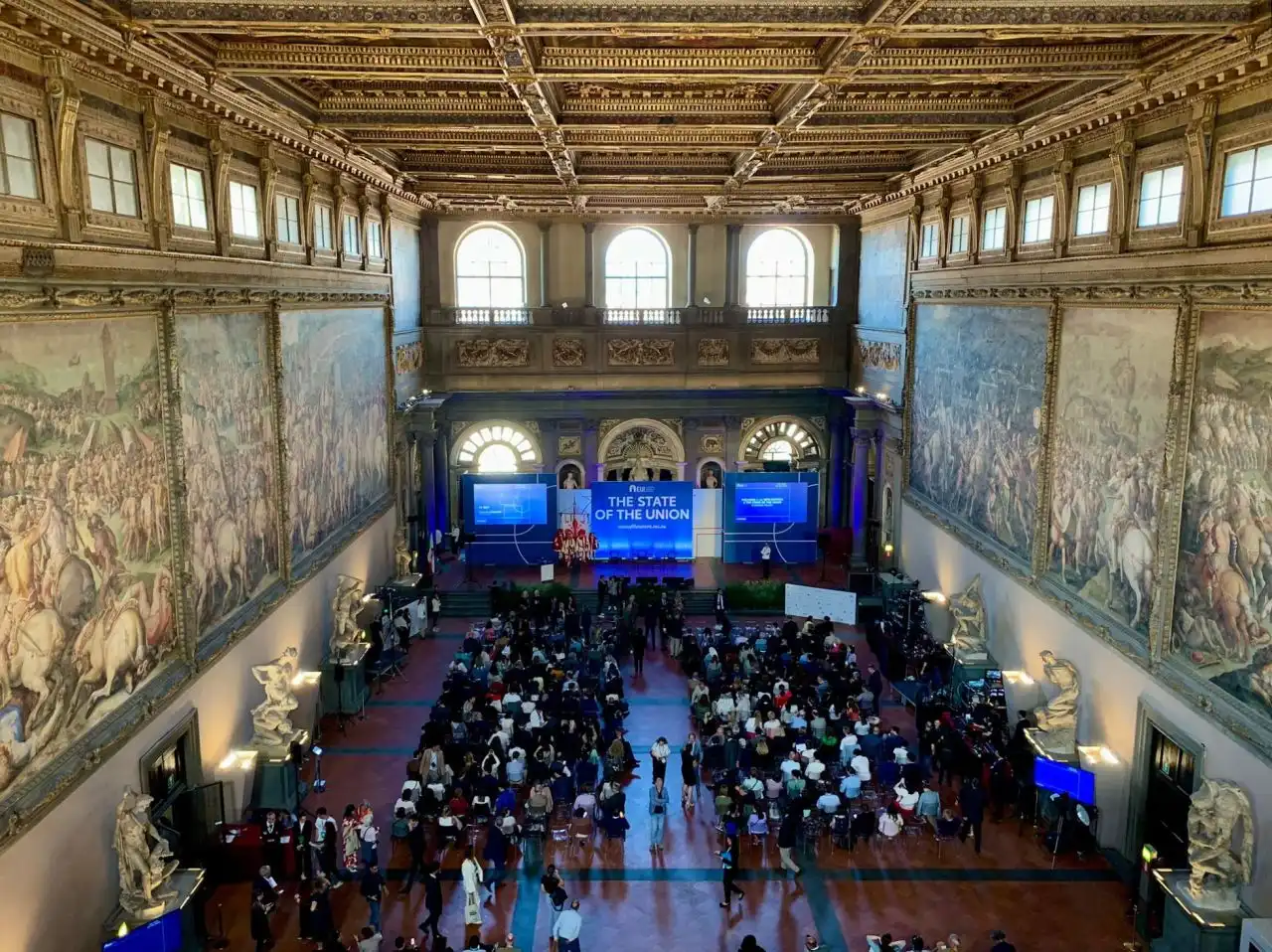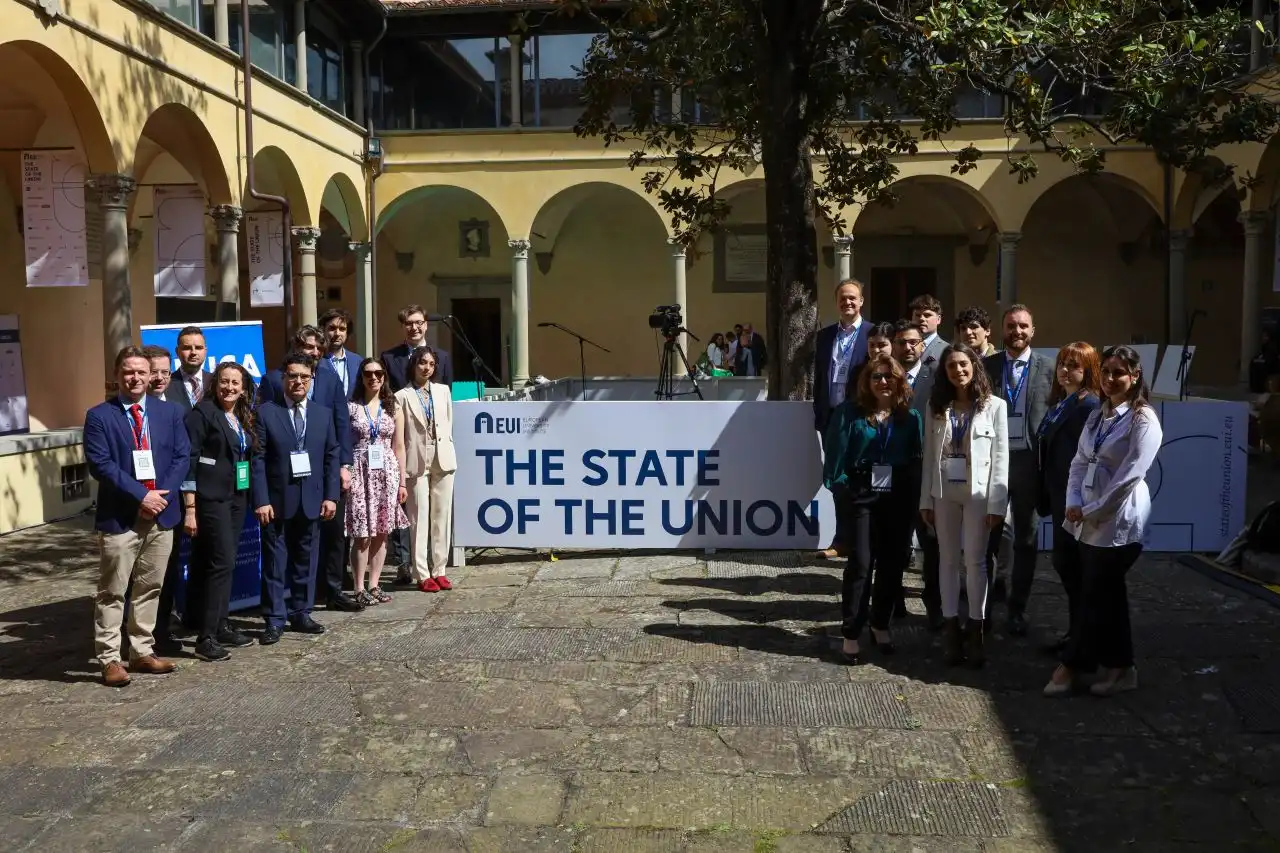Home>Europe: 2 Sciences Po Students at the State of the Union Conference in Italy
14.06.2024
Europe: 2 Sciences Po Students at the State of the Union Conference in Italy
Sciences Po is a founding member of CIVICA, the European University of Social Sciences. Thanks to this alliance, two Sciences Po students had the incredible opportunity to participate in the 2024 edition of The State of the Union at the European University Institute in Florence, Italy.

Both at the end of their first year of Master’s studies, Claire Jeudy studies European external relations – through the Master in European Affairs at the School of Public Affairs, while Stefania Santillo studies International Relations – through the Master in Political Science at the School of Research. Claire is deeply focused on Eastern Europe transitions, foreign interference and the challenges of EU integration, from an academic perspective and beyond. She is a volunteer Young European Ambassador for the Eastern Neighbourhood (EU Neighbours EAST, EU outreach programme). Stefania’s research focuses on the role of the EU as a geopolitical actor and notably on EU-Latin America relations in the realm of gender, security, and defence. Complementing her research endeavours, she’s an active member of the editorial board of Jeunes Européens Sciences Po and Sciences Po’s defence and strategy association (SPDS).
Read all about their experience as they recall it.
We met in Florence thanks to the State of Union, and enjoyed this opportunity together, to represent the Sciences Po student community!

Organised by the European University Institute in Florence, this two-day gathering of policymakers, analysts, and researchers offered us numerous thought-provoking insights into the EU’s current status and future directions across multiple domains. Immersed in the breathtaking Tuscan countryside and the heart of Florence’s historic city centre, we attended stimulating conferences and expert discussions on our policy and research interests.
EU enlargement to Ukraine in the aftermath of the war
One of the central themes of the 14th edition of the State of the Union was the accession of Eastern neighbouring countries to the EU, particularly post-war Ukraine. Issues, costs, and alternative methodologies for both the EU and candidate countries were extensively discussed from economic and (geo)political perspectives by prominent academics, policy experts, EU, and national institutional figures.
The conferences were notably enriched by the interventions of the Czech Minister of European Affairs, Martin Dvořák, and the Polish Under Secretary of State and Ministry of Science and Higher Education, Andrzej Szeptycki, with the latter emphasising Europe's interest in continuing to support Ukraine to preserve its values and independence in the face of the Russian threat. These sessions also sparked a lively and thought-provoking debate about fatigue and resilience within Ukrainian society, as well as the meaning of winning the war in the current scenario.
Combining the support to Ukraine to unwavering commitment to the other candidates
Some panellists, such as EU officials from the European Commission and the European External Action Service, highlighted the extensive programmes conceived, starting with unseen efforts to support Ukraine’s reconstruction and fight for freedom. Fundamental questions about the future of the EU's institutional functioning were inevitably raised, as the EU needs to be prepared with adapted reforms on representation, decision-making rules, and EU budget for the Western Balkans’ long awaited accession, and Ukraine. These issues underline how the candidates’ accession process are intertwined with the required EU internal reforms.
EU geopolitical orientation and priorities
Beyond its support for Ukraine, the EU was also analysed as a geopolitical actor aiming to enhance its role within the international system through a combination of soft and hard power. Pointing out the double standards underlying European strategies on the Ukraine and Israel-Hamas conflicts, significant divergences emerged regarding the expected priorities and role played by the EU, driven by different geographical and ideological perspectives.
Some speakers, disagreeing with the focus on the neighbourhood, emphasised the need to adopt a clearer, shared, and active position on broader geopolitical and human rights issues, notably the current situation in Gaza. From this perspective, European efforts to tackle foreign interference, including in local realities beyond the Union, were presented as part of the Commission and Member States' strategy to bolster the EU’s assertiveness against rival and threatening countries.
2024 elections: a crucial step to assess and readjust the fight against foreign interference
During the State of the Union, Vera Jourova, Vice-President for Values and Transparency of the European Commission, discussed the three scale methodology to fight disinformation, espionage, hidden manipulation, untransparent lobbying, cyberattacks and corruption.
While methodical responses to threats have been effective, the 2024 elections still represent a decisive test to assess a new strategy against foreign interference attempts to manipulate EU citizens. Promoting trust within European societies and towards political institutions, will remain a fundamental pillar of our democratic systems thanks to an improved step-by-step approach.
“Every European has to understand that the problems of the world will not be solved at the national scale"
Josep Borrell, Vice President-designate of the European Commission
Opening the last session at Palazzo Vecchio, a historic monument located in the heart of Florence’s city centre, the High Representative of the Union for Foreign Affairs and Security Policy, Joseph Borrell, delivered a straightforward message to his audience, advocating for a “revolution in the mindset” to enable the EU to finally learn to speak the “language of power.”

In a particularly assertive tone, the Spanish Commissioner emphasised the need for the Union to develop the capacity to defend itself and preserve its independent position in a multipolar world dominated by the rivalry between the United States and China. Despite the proliferation of tensions and threats, the High Representative reaffirmed his belief in political rather than military solutions, aiming to address the challenges of the near future, such as climate change, demographic shifts, and technological advancements.
EU industrial and digital competitiveness: modernising the single market
Despite the event being strongly influenced by geopolitical concerns and common defence aspirations, several conferences also discussed the prospects for the Single Market and the economic competitiveness of member states, particularly in relation to Artificial Intelligence and EU-related regulations.
Furthermore, the SOU 2024 provided a valuable opportunity to present, praise, and analyse the report "Much More Than a Market", recently released by Enrico Letta, former Italian Prime Minister and former Dean of Sciences Po's School of International Affairs (PSIA), currently President of the Jacques Delors Institute. The report focuses on reinforced cohesion of the Single Market through the role of private capital in modernising the Union's common financial framework, along with suggesting the establishment of research, innovation, and education as a “fifth freedom.”
While discussing Letta’s proposals to revitalise the Single Market experts from academia, private firms, and public institutions broadly debated the role of regulation and investments in enhancing the Union's industrial competitiveness, particularly in the digital sector.
A wonderful experience within the CIVICA cohort
By virtue of Sciences Po’s participation in the CIVICA university alliance, we were warmly welcomed and assisted by the EUI's CIVICA team throughout the entire event, resulting in an exceptionally stimulating experience that was undeniably enriching from academic, professional, and human perspectives.

Beyond the participation to panels, sharing this experience with a motivated and brilliant cohort of Master's and Ph.D. students from other CIVICA universities significantly enhanced the journey. During intense discussions over two days, we exchanged ideas on our thesis, research and career projects, and the upcoming European Parliament elections, gaining considerable academic and personal insights.
Moreover, attending conferences and actively engaging in discussions within our areas of interest and research, ranging from geopolitics to digitalisation, democracy, and green transition, proved invaluable for both of us. We actively participated in passionate and lively debates on the EU state of play, and future direction(s) of EU integration, internal policies and foreign policy dynamics. From a professional standpoint, this experience also provided a wonderful opportunity to delve deeply into the network of think tanks, international organisations, the “Eurobubble”: how different fields gather to confront their conflicting views, and converge towards discussed policymaking orientations.
The State of Union 2024, in the light of the elections and the latest geopolitical challenges, represented for both of us, an occasion to observe how researchers, stakeholders, international organisations and EU officials discuss in a slightly less formal setting. Participating in such an event, allowed us to gain an overview of organisations we could aspire to join after graduating, and enhanced our feeling of community within the CIVICA alliance.
Looking forward to the next inspiring opportunity provided by Sciences Po and CIVICA!

Open house days 2026

Virtual Undergraduate Open House day 2026
Come meet our teams and students at our campuses.
Virtual Graduate Open House day 2026
Meet faculty members, students and representatives and learn more about our 30 Master's programmes.